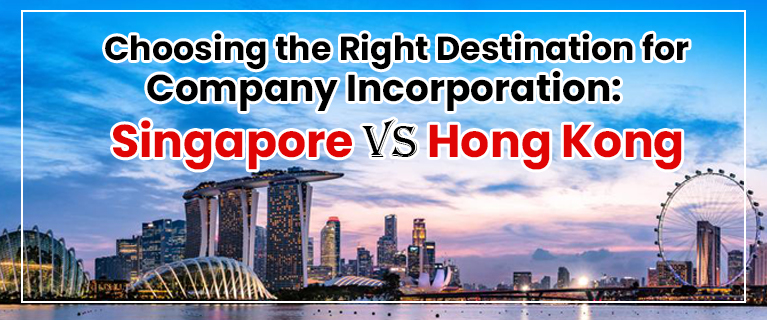Choosing the Right Destination for Company Incorporation: Singapore vs Hong Kong
When it comes to establishing a business in Asia, two shining stars often emerge as the top choices: Singapore and Hong Kong. Both these territories have consistently attracted foreign entrepreneurs with their stable governments, business-friendly regulations, and enticing tax benefits for startups. However, selecting the right destination for your company incorporation between these two economic powerhouses requires a meticulous analysis of various factors.
Asia has been a hotbed for business opportunities for several decades now, thanks to its dynamic economies and robust financial ecosystems. According to the World Bank, the top five Asian countries that are the most welcoming for foreign entrepreneurs are Hong Kong, Singapore, Malaysia, Thailand, and Taiwan. While each of these countries has its unique advantages, Singapore and Hong Kong have long been in a friendly competition to woo businesses and investors.
This article dives deep into the comparison between Singapore and Hong Kong as ideal destinations for company incorporation. From the type of corporate entities available to taxation procedures and legal systems, we'll explore the essential factors that can help you make an informed decision.
Read Also This – Starting a Security Company in SingaporeIncorporation of a Private Limited Company: Singapore vs. Hong Kong
The first step in your company incorporation journey is to decide on the type of corporate entity that suits your business needs. In both Singapore and Hong Kong, you have various options, but the Private Limited Company stands out as the preferred choice for many. Let's compare the process of incorporating a private limited company in these two territories:
1. Authority Responsible:
- Singapore: The Accounting and Corporate Regulatory Authority (ACRA) oversees company incorporations.
- Hong Kong: The Companies Registry is the relevant authority for company incorporation.
3. Shareholders:
- Singapore: A private limited company in Singapore can have a minimum of 1 and a maximum of 50 shareholders.
- Hong Kong: Similarly, a private limited company in Hong Kong can have a minimum of 1 and a maximum of 50 shareholders.
4. Director Requirements:
- Singapore: At least one director must be a natural person and a resident of Singapore.
- Hong Kong: In Hong Kong, at least one director (resident or non-resident) must be a natural person.
5. Company Secretary:
- Singapore: In Singapore, the company secretary must be a resident of Singapore.
- Hong Kong: In Hong Kong, the company secretary must be a resident of Hong Kong.
6. Minimum Paid-Up Capital:
- Singapore: There is no mandatory minimum paid-up capital requirement to start a business.
- Hong Kong: Hong Kong also does not have a mandatory minimum paid-up capital requirement.7. Name Approval:
- Singapore: The name of the company must be approved before incorporation.
- Hong Kong: In Hong Kong, there's no need for prior name approval, but the chosen name must not infringe on existing company names or trademarks.
Taxation Procedures:
Both Singapore and Hong Kong offer favourable taxation rates, ranging from 16% to 17%. However, their taxation systems differ:
Hong Kong: It follows a purely territorial tax system, meaning income earned outside of Hong Kong is not taxed, including repatriated income.
Singapore: Singapore's tax system is partly territorial, where income sourced solely from Singapore is taxed. Certain types of income earned in foreign countries may be subject to tax upon receipt or remittance in Singapore.
Both countries have double taxation agreements with major nations like China, Japan, Canada, and the UK. Singapore has signed agreements with more countries compared to Hong Kong. Additionally, both Singapore and Hong Kong offer tax exemptions and incentives for startups and small businesses.
Legal System and Trade Agreements:
Singapore and Hong Kong share commonalities in their legal systems. They both follow British Common Law principles, ensuring strong enforcement of contractual obligations. Both countries offer robust dispute resolution mechanisms through Arbitration and Conciliation, making them attractive for international businesses.
Read Also This – Important Guidelines on Singapore Company Registration ProcessBoth Singapore and Hong Kong have entered into bilateral and multilateral free trade agreements (FTAs) to facilitate business and trade. They maintain low tariffs on various goods and services, encouraging international commerce.
Quality of Life and Infrastructure:
Both Singapore and Hong Kong provide a high quality of life to residents and entrepreneurs alike. They offer safe, multicultural environments and world-class infrastructure facilities. The World Economic Forum ranks Singapore at number 1 and Hong Kong at number 2 in terms of infrastructure.
Market Access and Expansion Opportunities:
One crucial aspect that entrepreneurs must consider when deciding between Singapore and Hong Kong is market access and expansion opportunities. Both territories serve as excellent gateways to larger Asian markets, including China and India. Here's a closer look:
Singapore: Singapore's strategic location allows businesses to tap into the rapidly growing markets of Southeast Asia. It has established itself as a regional business hub, offering access to the Association of Southeast Asian Nations (ASEAN) markets, comprising ten diverse economies. Singapore's free trade agreements (FTAs) with various nations provide businesses with preferential access to these markets. Furthermore, the Singapore government actively promotes internationalization, offering grants and support for companies looking to expand overseas.
Hong Kong: With its proximity to mainland China, Hong Kong is a favoured choice for businesses seeking to enter the vast Chinese market. The Closer Economic Partnership Arrangement (CEPA) between Hong Kong and China provides preferential access to Chinese markets for Hong Kong-based companies. Additionally, Hong Kong serves as a vital gateway for foreign investment into China and facilitates cross-border trade.
Cost of Living and Business Operation:
While both Singapore and Hong Kong offer a high standard of living and business-friendly environments, entrepreneurs should consider the cost factors:
Singapore: Singapore is known for its efficiency and high-quality infrastructure, but it also comes with a relatively high cost of living and business operation. Rental costs, in particular, can be significant. However, the government offers tax incentives, grants, and financing schemes to ease the financial burden for startups and SMEs.
Hong Kong: Hong Kong, too, has a reputation for its competitiveness, but the cost of living and operating a business can be substantial, especially for office space. However, like Singapore, the Hong Kong government provides tax benefits and support measures for businesses.
Conclusion:
Choosing between Singapore and Hong Kong for company incorporation is not a straightforward decision. Each territory offers a wealth of opportunities and advantages. To make the right choice, entrepreneurs must carefully evaluate factors like geographical location, market demand, and cultural fit. However, considering the recent political developments and uncertainties in Hong Kong due to its relationship with China, Singapore has emerged as a preferred destination for many foreign businesses.
Ultimately, the decision depends on your specific business needs and long-term goals. Whether you opt for the vibrant city-state of Singapore or the bustling metropolis of Hong Kong, both destinations can provide a solid foundation for your business to thrive in Asia and beyond.
Read Also This – The Complete Procedure to Register a Company in SingaporeIn conclusion, the decision between Singapore and Hong Kong for company incorporation depends on various factors, including your target market, cost considerations, and political stability. Both territories offer unique advantages and have strong track records as business destinations.
While Hong Kong has historically been a primary choice for businesses aiming to access the Chinese market, recent developments have led some entrepreneurs to reconsider their options. Singapore, with its stability, strategic location in Southeast Asia, and strong government support, has become an increasingly attractive destination.










